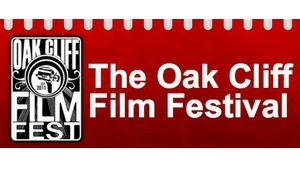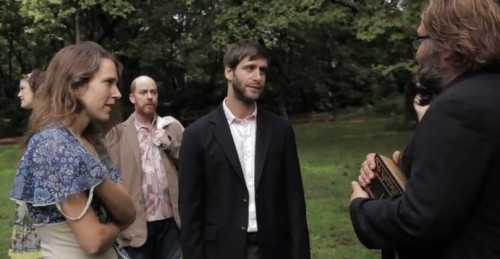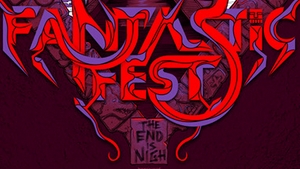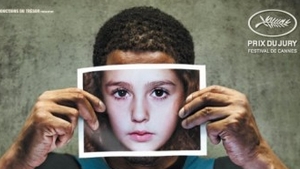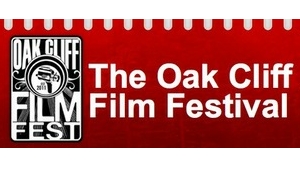 Writer/Director Onur Tukel’s film Richard’s Wedding, takes an ordinary story about a group of friends and one couples wedding, and turns it into an adventure that will keep you guessing what’s next until the very end. The film premiered at the 2012 Sarasota Film Festival, where it took home the Special Jury Prize for Best Screenplay in the “Independent Visions” program. This week, Go,See,Talk sat down to talk with Tukel about his film, which will screen during the Oak Cliff Film Festival on Sunday, June 17 at 3 pm.
Writer/Director Onur Tukel’s film Richard’s Wedding, takes an ordinary story about a group of friends and one couples wedding, and turns it into an adventure that will keep you guessing what’s next until the very end. The film premiered at the 2012 Sarasota Film Festival, where it took home the Special Jury Prize for Best Screenplay in the “Independent Visions” program. This week, Go,See,Talk sat down to talk with Tukel about his film, which will screen during the Oak Cliff Film Festival on Sunday, June 17 at 3 pm.
Check out the trailer for Richard’s Wedding and the insightful interview session we had with Onur Tukel…
—————————————————————————————————————————————————————————–
– Despite the eccentric characters and often, unusual plot twists, watching Richard’s Wedding feels very much like watching a group of friends in real life. Was this a goal of the film, and can you talk about the inspiration behind the story?
Some of my favorite memories involve partying with my friends in some way. I have so many wild stories from high school, college and afterwards, of friends coming together, doing stupid things, getting arrested, getting into a bar fight, etc. The night would usually start off with a little drinking, a lot of conversation, and by the end of the evening, something ridiculous would happen and then weeks later, years later, we’d all laugh about it. I directed four feature films prior to Richard’s Wedding, and most of those sets were like creative socials. Sure, we would focus on making the movie at hand, but there was a lot of goofing around and silliness too. It’s always been that way with me. I surround myself with thoughtful, sweet people who have a penchant for moderately, intelligent conversations, but like to howl at the moon from time to time.
When I was a child, my mother used to throw these dinner parties with all of her Turkish friends that would last until four in the morning. The children would all be thrown into one large room while the adults drank and talked in the other room. The children would be scattered all about, on couches and the floor, and we could hear all the parents talking and howling with laughter in the other room. It was insane. What could people be talking about like that until the wee hours of the morning?
I’ve always been drawn to small gatherings, with lots of people talking. I like the energy and the different point-of-views, the laughter, the playful ridicule, the dumb jokes and two-bit philosophical conversations. I like to ask inappropriate questions. I like to be asked inappropriate questions. I like to pry. There’s so much potential when talking. Why not be post-modern about it? Seek out what’s never been asked or said.
I’m not a big fan of weddings, actually. They make me sad for some reason. I’m reminded that I don’t have the temperament for marriage, I think, but Richard’s Wedding gave me a chance to celebrate all those mad memories I made and continue to make with my friends. There’s a chaotic energy to it all. We felt/feel like we could say and do anything and no one would/will judge us. We could make fun of everyone and everything, and no one took it personally. I was inspired by these memories.
– Are there certain films or filmmakers that you looked to when making the film, and who are some filmmakers you admire or feel an affinity with in general?
There were two movies that specifically informed Richard’s Wedding. Mark Duplass’ The Puffy Chair and Richard Linklater’s Tape. I love almost everything about The Puffy Chair, but it was one short scene in particular that inspired me. It’s a simple scene; two brothers and their girlfriends are hanging out in a backyard. One of the brothers (Duplass) performs a silly, drunken wedding ceremony and pronounces his brother and his girlfriend (that he just met that day) husband and wife. It’s sweet and silly and touched me in ways that other wedding films never had. It occurred to me then that you could make a wedding movie based solely on funny words instead of pageantry.
Tape is a completely different movie. Based on a play by Stephen Belber, Linklater’s film takes place in real time in a hotel room. The first half of the movie consists of two friends (played by Ethan Hawke and Robert Sean Leonard) hanging out, drinking, smoking pot, and catching up after several years apart. They eventually talk about a third character (Uma Thurman) who doesn’t show up until the second half of the film. The movie is brilliant in its simplicity. One location, one costume for all the actors, and the only real production value extracted from Belber’s great dialogue and the actors’ terrific performances. I also love how Belber is able to cram so much plot into a storyline with such a simple foundation. As a director, I think Linklater performs somewhat of a miracle. The movie is never dull. In fact, it’s pulsing with energy, and humor and sadness, and suspense. It’s brilliant. So for the first twenty minutes of Richard’s Wedding, we have two characters (Alex and Tuna) walking through New York, talking about characters that will appear later. The style of this first act also mirrors two other Linklater films, Before Sunrise and Before Sunset. I love Linklater. I think unconsciously I named my movie after him.
In general, I’m drawn to word and performances. There are so many great directors whose work I admire. Nicole Holofcener is brilliant. Adrienne Shelly’s Sudden Manhattan was one of my favorites in the nineties. Woody Allen. Hal Hartley. Whit Stillman. Richard Linklater. Noah Baumbach. Neil Labute. I admire all of these filmmakers. Also, Lynn Shelton, Humpday is one of my favorite indie movies of all time and I think she’s brilliant!
There are also a crop of bad-ass indie filmmakers that have me really excited. They’re making incredible movies on extremely small budgets. Dustin Guy DeFa, Kentucker Audley, Brandon Harris, Amy Seimetz, Jarred Alterman, Zach Clark, Keith Miller, Dan Sallitt, Calvin Reeder, Lawrence Levine, Sophie Takal, Brent Chesanek, Bill and Turner Ross. It’s an exciting time to be an indie filmmaker. There are so many people committed to making art as opposed to money. It’s refreshing! I wish Hollywood studio would take the budget of just one of their over-priced studio movies and spread it out to these folks. For the price of one bad twenty-million dollar movie, the studio would have twenty really unique indie films.
I’ve also had the pleasure of working with two great filmmakers, Michael Tully and Alex Karpovsky. It’s going to be fun to watch their careers continue to develop.
– What made you chose New York, and Central Park specifically, as the backdrop for the film? Are a lot of the cast and crew local to that area, and what was the process of recruiting everyone who became a part of the film; how did this cast come together?
I moved to New York on Halloween of 2010 and the goal was to make a movie here. I’ve always loved New York and was too afraid to move here in my twenties. My attitude changed after I was cast in Michael Tully’s Septien as Amos Rawlings. I was on that movie set for two weeks in Nashville, TN and the experience changed my life. Making Septien was such a new and beautiful experience. It was ethereal and raw, terrifying and electrifying. When I got back to North Carolina, everything felt normal again and it was horrible. I wanted every day to feel like the Septien set. So I moved to New York, talk about terrifying and electrifying! It’s a wonderland. It’s a cesspool. It’s everything. I love it. I think I met everyone involved in Richard’s Wedding as a result of Septien, which premiered at Sundance in 2011. I met cast members for Richard’s Wedding either at Sundance parties, or after Septien screenings or at one function or another related to Septien. It showed at the IFC Center in New York and played BAM Cinefest, and I met several crew members and cast members there. The only cast member I officially auditioned was Randy Gambill, who plays the character of Louis. I invited everyone else to script readings. If someone seemed right for the role, I offered it to them. I tried to keep the cast as local as possible. I’ve had friends who have spent thirty percent of their tiny film budgets just flying people in from out of town and putting them up in a hotel. There was none of that on Richard’s Wedding.
– Hidden underneath the sarcasm and egotism, the characters all seem to be searching for the true meaning love, friendship and life. Were these themes you were interested in exploring with the film, or did these come about organically through the process of creating the story?
I had multiple readings with cast members throughout the script-writing process. We would discuss the script throughout the readings, and afterwards, which allowed me to do two things. First, it allowed me to tweak the dialogue so that it sounded more conversational. It’s a simple method, really. Just have the actors read the script. You hear what works and doesn’t work. You make notes on your script. You rewrite, then you have another reading and you tweak some more. During the process too, you’re able to see which characters are flat or inconsistent. Josephine Decker plays the role of the bride, Phoebe, and she gave great feedback about her character during the readings. She felt like I hadn’t given her character much to do. She lacked dimension. And through the rewrites, she became a stronger, more interesting character. These readings and rewrites helped everything overall.
Also, things that were nothing on the page became very magical on screen. In the script, the wealthy web app designer Russell says, “Humanity is dead.” The set direction I’d written in the script was very simple. Knock on door. Russell answers it. It’s Richard! Everyone greets him. But in the film, it’s so dramatic when Russell says his line. And then Richard arrives and the friends all gather around and shower him with affection. It’s really beautiful and I think a defining moment in the movie. At one of the bleakest moments, we’re reminded that friendship is important. Community is everything. Humanity is not dead.
There are moments when Mother Nature became a co-writer on the script. While we were shooting the emotional climax of the movie, when everything is falling apart at the wedding, it started to rain. This was never scripted, but it made perfect sense that it would start raining at that time. It reinforced the spiritual themes throughout the movie. Some of the characters insisted God be part of the ceremony, and others think God should be left out. What a great scene to include rain as a metaphor for “washing away the sins.” It was all perfect, but never intended to be part of the script. So yes, this definitely came about organically.
There’s a moment in the movie that seems to speak to a lot of people. The ne’er-do-well priest Louis asks all the wedding guests, “What is friendship,” and then everyone gives their answer. I really love this scene. It comes deep in the third act, when the audience has been given a chance to know the characters a bit. We’re in the middle of a wedding ceremony that’s close to unraveling. The wedding guests are delirious. But this question posed, it allows the characters to reconnect with each other in the face of all this chaos. This feels about right for me. I’m overly neurotic about things. I focus on the negative too much. My thoughts are often gloom and doom. Things often feel like they are on the verge of falling apart. Feeling connected to a group of friends assuages these feelings a bit. Making a movie even more so. You’re making art with a group of people. When it’s fun, it’s a
brilliant experience.
– Can you talk about how you first become involved in the film world, and how does this film compare to the work you’ve done in the past; how have your experiences differed depending on what role you are playing in the filmmaking process?
I’ve been making movies in some fashion since I was in sixth grade. But I didn’t take it seriously until I was around 24-years-old. I wrote and directed a black and white 16mm feature called House of Pancakes. After that, I wrote and directed three additional features, my best being Ding-A-Ling Less. Each movie was different, but I learned the most on my last movie called The Pigs (I used the pen-name of Noel Anderson as writer and Sergio Lapel as director). Making that movie was a pretty wretched experience. I did everything wrong. I purged my demons on the commentary track of the DVD and basically apologized to everyone who worked on that movie. I do know that my biggest mistake on The Pigs was over-planning.
I storyboarded every shot. I blocked every movement. I worked and reworked almost every detail of the movie going into production, and I left no room for spontaneity. None of it worked. Every minute on set was just an exercise in failure. The script was too ambitious. The crew was too inexperienced. The budget was too low, the schedule too tight. I was a tyrannical piece-of-shit. I lost my nerve after that and I promised myself that if I ever made another movie, I was going to have fun. So going into Richard’s Wedding, I gave myself two rules: have fun and allow room for spontaneity, improvisation, and input from everyone.
– Any current projects you are working on, and can we expect to see you directing more feature-length films in the future?
After The Pigs, I swore off filmmaking. Instead, I decided to try my hand and writing and illustrating children’s books. I’ve had a little luck lately with that and I’m finishing up my 2nd book, “Rainstack!,” that will come out next spring from Amazon Books. After that, the hope is to make a movie about an aging rock n’ roll star struggling to complete a studio record after a decade-long hiatus. I’m excited about it, mainly because the musician, Block, is talented and fearless and wants to do something audacious. So I hope my luck continues because it all sounds like a really good time. I’m also co-starring in a movie by Alex Karpvosky called Red Flag, which also co-stars Jennifer Prediger from Richard’s Wedding and premiers at the 2012 LA Film Festival.
For more on the Festival, click this link to the main page for the Oak Cliff Film Festival as well as more in-depth interviews on the official OCFF Tumblr page.
